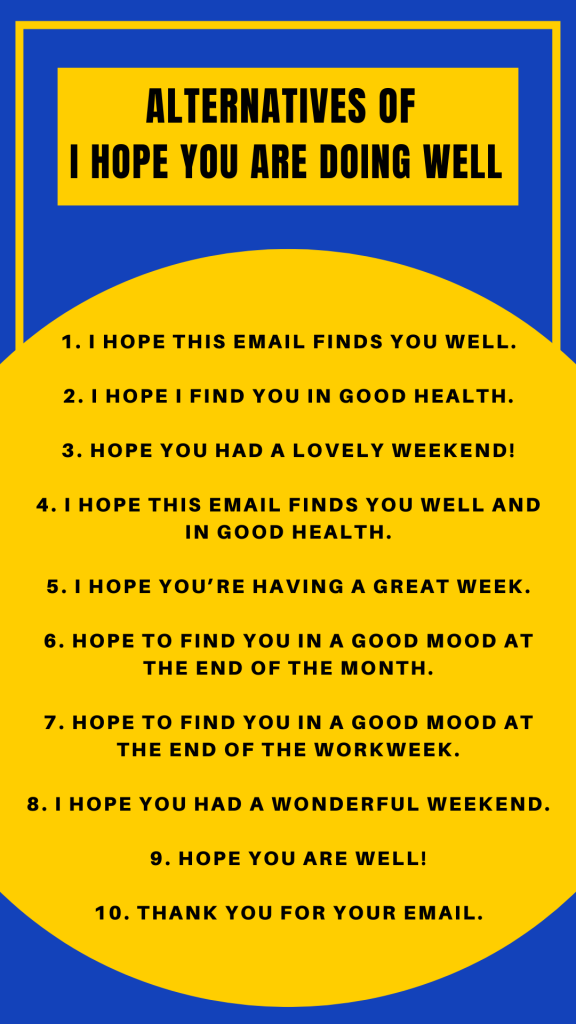The phrase, “I hope you are doing well” is a common way to express your concern for someone’s well-being. It expresses supportive feelings.
You can start your initial email to someone with the short sentence ”I hope you are doing well” in order to to make the other person feel that he can trust you. He can feel that you take care of him.
Is it correct to say “I hope you are doing well”?
Yes, it’s totally fine to use this phrase in your business emails/correspondences. ”I hope you are doing well” is a very common phrase that many people use.
Where to put “I hope you are doing well”?
You can place the phrase immediately after your greeting:
Dear Sarah,
I hope you are doing well! I wanted to reach out to you about …
or
Hi Peter,
I hope you are doing well and that the month has been going smoothly.
Formal Alternatives to “I hope you are doing well”
1. I hope this email finds you well.
It simply wishes you a good day or that it’s been a long time since they’ve heard from you.
2. I hope I find you in good health.
The phrase has a lot of meanings depending on the context in which it is said. Sometimes, people say it out of courtesy, sometimes, when they know that the other person has been sick, so they want to check if they are feeling better now. After Covid-19, many people use the phrase to make sure the recipient of their message is not on sick leave.
3. Hope you had a lovely weekend!
Some people use it because they really care if the recipient had a nice weekend ( because they have talked about it before). Others think it’s just a common and polite greeting to start their message with.
4. I hope this email finds you well and in good health.
Here again, the importance of suspecting that you may not be in your workplace due to the pandemic that has emerged is highlighted.
5. I hope you’re having a great week.
A person might use the phrase “I hope you’re having a great week” to express happiness and good fortune for the person they are talking to, conveying that they hope that this person has had a smooth week so far.
6. Hope to find you in a good mood at the end of the month.
The phrase has been associated with many different meanings over time. One of the most popular interpretations is that it’s a phrase used when someone is feeling discouraged or when they have lost hope.
It’s still hard to describe what a good mood might look like at the end of the month, but it might involve happiness.
7. Hope to find you in a good mood at the end of the workweek.
It’s often used as an inspirational quote. The sender wants to emphasize that you might be feeling exhausted, but also to make you feel better because it reminds you that the weekend is coming soon.
8. I hope you had a wonderful weekend.
It’s a synonym with “I hope you had a wonderful weekend!”.
9. Hope you are well!
When we say this, we want to convey the message that we care about the person. In this context, it is a friendly greeting.
10. Thank you for your email.
It’s a polite way of saying thank you for receiving an email in response to your inquiry or request.

Casual Ways to Say “I hope you are doing well”
1. Glad to hear from you, and how are things with you?
2. I hope everything is going well with you, what’s up?
3. It’s been a while since we last talked, how are things going?
4. Just wanted to say hi and see how you are doing.
5. I hope you are doing well and are in a positive mood.
6. Hey there, I hope everything is great!
7. I hope things have been going great in your life lately.
8. I hope your day goes better now!
9. I hope that you are doing well and enjoying your day.
10. I’m wondering how things have been for you recently.
How to answer to “I hope you are doing well”?
1) I am fine. Hope you are also doing well.
With this answer, you both answer how you are and you want to hint that you hope the other person feels good too. For example, when you’re in a hurry and don’t have time for long conversations, you can use this reply to save yourself a long explanation.
2) I am very well, thanks, and hope you are as well.
This answer is very similar to the first, but a little more polite, because in this case, you are showing gratitude.
3) Today I feel much better than yesterday. Thanks for asking.
When yesterday feels like we were busier and more tired you can tell that today feels much better.
Let’s use different responses than a simple answer like – I’m fine. This way you will also be able to tie in a conversation. Such as the other party continuing with ”What happened yesterday?”.
4) I’m doing well, thank you and I hope the same at your end as well.
Again a very similar response to the first two. However, it can be used in more formal messages.
5) I am very well, thanks. How are you?
This is a very typical answer that you will hear very often.
6) I’m doing pretty well. What about you?
Here we use а superlative of well. Which means that we feel better than normal.
Sample emails
EXAMPLE 1
Dear Oliver,
I hope you are doing well!
I was interested to learn that your company is currently looking for a sales manager. For the past five years, I’ve worked in the sales department of an IT company and have been employed as an assistant to the sales manager. I think I have great working knowledge and I’ll be the best person for this position.
I’m looking forward to your feedback.
Yours faithfully,
(YOUR NAME)
EXAMPLE 2
Good morning Mr. Brown,
Hope you had a lovely weekend!
Thank you for your email of 4th March requesting a double room with bath and shower and a view of the sea.
We’ve reserved the accommodation you describe for the period you require and would be grateful if you could forward a deposit of $30 as soon as possible to confirm the reservation.
We look forward to your stay with us.
Yours sincerely,
(YOUR NAME)
EXAMPLE 3
Dear Tom,
I hope this email finds you well and in good health.
I’m due to be in Frankfurt next week on business, and I was wondering if we could meet somewhere for dinner; it seems such a long time since we last saw each other. How about restaurant Elia on Thursday at 6 pm?
Looking forward to seeing you again!
Best wishes,
(YOUR NAME)









